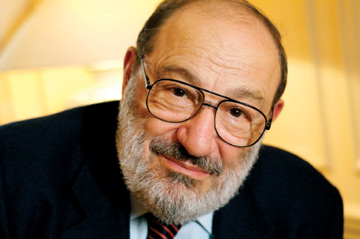Umberto Eco, The Author Of ‘The Name Of The Rose’, Dies At 84
Umberto Eco, the Italian intellectual and novelist, whose 1980s novel The Name of The Rose brought him international renown, died Friday at the age of 84.
Italian Prime Minister Matteo Renzi called him “an extraordinary example of a European intellectual, combining unique intelligence of the past with a limitless capacity to anticipate the future.”
Eco had been suffering cancer, although his cause of death has not been disclosed. Dario Franceschini, Italy’s culture minister, said in a tweet that he remained youthful until his last day.
Eco was born in Alessandria in northern Italy in 1932. He had a desire to write from a young age, even though his first novel was not published until 1980. He rejected his father’s wish that he study law and instead studied philosophy and literature at the University of Turin. He worked as a cultural editor at Italy’s state broadcaster RAI and went on to develop his interest in semiotics, becoming a semiotics professor at the University of Bologna, Europe’s oldest university. He wrote some significant academic works, “On Beauty” and “On Ugliness,” which explored how perception is shaped by history. He founded the communications department at the University of San Marino in the 1980s and became the chairman of the Higher School of Humanities at the University of Bologna.
Eco was fluent in five modern languages as well as Latin and classical Greek and traveled a lot for academic conferences and book tours. He was a chain smoker and liked to banter with his students over cheap wine.
After the success of The Name of The Rose, which spawned it’s own movie starring Sean Connery, Eco’s later works received mixed reviews, although his wide readership remained. Eco’s most recent work was published just last year. The novel, which the New York Times said was filled with “ideas and energy,” was called Number Zero and centers around a new newspaper in Milan funded by a meddling tycoon. Later this year Eco’s last novel will be published posthumously.
Something very important to Eco was not to derive his work from popular tastes.
“It’s only publishers and some journalists who believe that people want simple things,” he told The Guardian in 2011, “People are tired of simple things. They want to be challenged.”
But he also did not believe in high-brow literature.
“I am not a fundamentalist saying there’s no difference between Homer and Disney,” he explained, “But Mickey Mouse can be perfect in the sense that a Japanese haiku is.”
Eco also wrote books and literary criticism and believed that “books always speak of other books, and every story tells a story that has already been told.”
He called himself a philosopher and was quoted saying, “I write novels only on the weekends.
A professor of cognitive linguistics at the University of California Berkeley and friend of Eco, George Lakoff, said that he not only understood culture, but created new culture.
“That is what this man is about,” said Lakoff. “Not only that,” he added, “He loved it. He enjoyed every minute of it. To be with Eco was to just enjoy life.”
Eco is survived by his German wife, Renate Ramage, and their two children, Stefano, a television producer, and Carlotta, an architect.
RELATED ARTICLES
Get the most-revealing celebrity conversations with the uInterview podcast!








Leave a comment